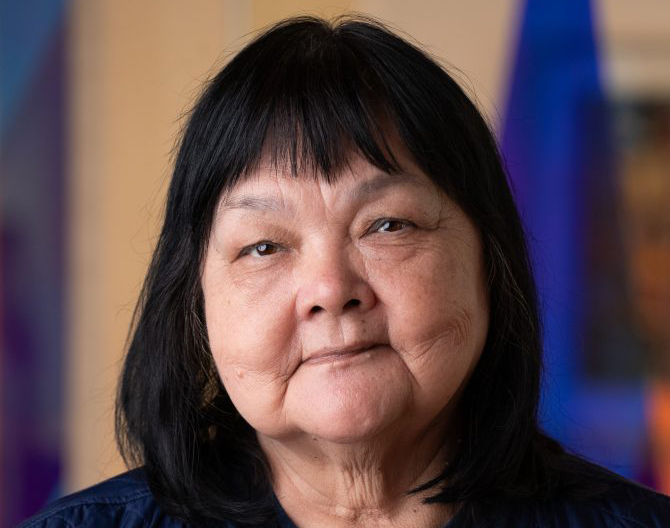
By Odette Auger, Buffalo Spirit Reporter
Miskinâhk Iskwew (Turtle Woman) Kokum Lorette Goulet carries her teachings the way a turtle carries its shell: with steadiness and quiet strength.
The Métis Elder has spent her life nurturing healing within her community and with the land itself. Her name, given in ceremony, reminds her to move with patience and purpose and to care for the Earth as a living relative.
“Turtles teach us to be grounded, to carry our home, our teachings, with us everywhere we go,” Miskinâhk Iskwew said. “We are meant to walk slowly, but with purpose. Never to forget the Earth under our feet.”
Miskinâhk Iskwew emphasizes the need to return to the balance that has been disrupted in our hearts and on Earth. In a recent webinar hosted by Indigenous Climate Action, she shared key principles that have shaped her life and continue to serve as a guide for restoring harmony between people, communities and the land.
Healing starts with love
As a guiding force in all healing work, Miskinâhk Iskwew said love must come before everything else, even in the face of adversity.
"Love is at the core of everything," she said. "We are living in a world that is broken, but when we stand together in love, that’s where the healing starts." This belief is central to her approach, whether working within family or addressing larger community issues.
Her understanding of love is not just as an emotion, but as a force for active healing.
"We have to heal ourselves before we can heal the land," she explained. "It starts with the relationship we have with ourselves, our families, and then it extends outwards to the community and the Earth." In the context of climate change, this means embracing a collective sense of responsibility to protect the Earth, an act of love not only for future generations but also for all living beings that rely on the land's balance to survive.
Cycles of growth and death
Miskinâhk Iskwew also teaches the need to understand natural cycles. Life, growth and death are interconnected in the ecosystems she speaks about, and acknowledging these cycles is essential for understanding environmental change.
"The Earth itself teaches us about the cycles of life. We need to honor the growth and the death of things, because both are part of this beautiful circle," she said.
This understanding extends beyond the life cycles of plants and animals. It includes the health of the land itself. She reflected on how humans have disrupted these cycles through short-sighted exploitation.
"We are part of the land and the land is part of us," Miskinâhk Iskwew said. "When we take too much without giving back, the cycles are thrown off balance and it leads to harm, both to us and to the Earth."
For Miskinâhk Iskwew, the lessons from nature are clear. We must learn to live in harmony with the cycles of the land, respecting the processes of growth, death and renewal.
Miskinâhk Iskwew said the current environmental crisis driven by resource extraction represents a break in these natural cycles. She encourages people to look closely at how human actions have impacted ecosystems.
"When we take, we need to give back," she reminds us, urging a return to reciprocal relationships with the land.
Restoring balance through the Medicine Wheel
Miskinâhk Iskwew uses the Medicine Wheel as a symbol of balance. The four quadrants—spiritual, physical, mental, and emotional—must be in harmony for holistic well-being.
"When one part of the wheel is out of balance, everything else starts to wobble," she explained.
Balance in the Medicine Wheel includes how humans relate to the natural world, she said. "If we don't keep these four aspects of life in balance, we end up in chaos. The Earth is suffering because our society is out of balance."
Environmental damage comes from a disregard for the teachings of balance and reciprocity, Miskinâhk Iskwew said. “We need to come back to the wheel,” she urged, “to restore balance, not just in ourselves, but in the land, the water, and the sky.”
Her call is for a return to every being having its place and purpose and contributing to the collective good.
The path forward
Miskinâhk Iskwew encourages people to come together and restore balance through love, respect for the land, and a shared commitment to healing.
"When we stand together, we are strong," she said, "and that strength can restore the balance that has been lost."
Her teachings are a call to action, a reminder that healing ourselves and our communities is part of healing the Earth.
Top Photo: Miskinâhk Iskwew (Turtle Woman) Kokum Lorette Goulet. Edmonton Library Photo, used with permission from Lorette Goulet.
